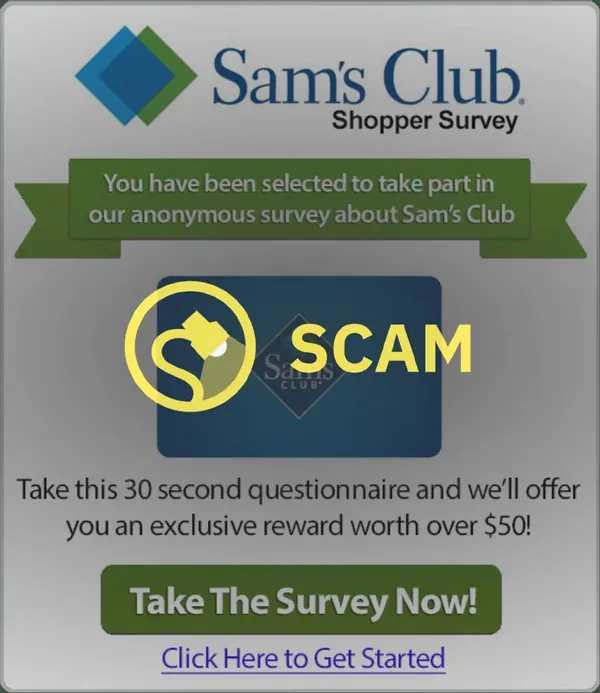Sam’s Club Shopper Survey 2023: What You Need To Know About This Email Scam
Email scams have been around for as long as email itself, and scammers are constantly coming up with new and creative ways to trick unsuspecting victims. One of the latest email scams to make the rounds is the Sam’s Club Shopper Survey email scam. This scam promises a gift card or reward in exchange for completing a survey, but in reality, it’s an attempt to steal your personal information.

Details of the scam
The Sam’s Club Shopper Survey email scam typically begins with an email that appears to be from Sam’s Club. The email promises a gift card or other reward in exchange for completing a survey about your shopping experience. However, to claim the reward, the email asks for personal information, including your name, address, and credit card information. In reality, there is no gift card or reward, and the email is just an attempt to steal your personal information.
My Experience with Sam’s club shopper survey email scam
So, this scam email I came across had a subject line that said “Confirmation Needed.” It pretended to be from “Sam’s Club” and claimed to offer a $50 gift card. The catch? All you had to do was fill out a quick 30-second questionnaire called the “Sam’s Club Shopper Survey.” Tricky, right?
The email came from an address that ended in @sendinblue.com, but here’s the catch: legitimate emails from Sam’s Club would come from an address ending in @samsclub.com. So right off the bat, we can smell something fishy, right?
Now, when I clicked on the link in the email, it took me through a series of redirects, and eventually landed me on a website called herbonlinereward.com. And guess what? It had nothing to do with Sam’s Club, even though the whole email was pretending to be from them.
So, what was the deal on this website? Well, they presented me with various products that I could supposedly get for “free.” But wait, there’s a catch (there always is). They claimed that I only needed to pay for shipping and handling. They really know how to make it sound tempting, don’t they?
But here’s the thing: none of these items had any connection whatsoever to Sam’s Club. It was all a clever ruse to make it seem like they were associated with Sam’s Club and get people to fall for their trickery. Sneaky, sneaky scammers!
How to recognize email scams Sam’s club shopper survey email scam
There are several warning signs to watch for when it comes to email scams. Be wary of emails that ask for personal information, that contain spelling or grammar errors, or that offer something that seems too good to be true. If you receive an email that you’re not sure about, do not click on any links or provide any personal information. Instead, contact the company directly to verify the authenticity of the message.
However, if you have been scammed, report to FTC.
Protecting yourself from email scams
To protect yourself from email scams like the Sam’s Club Shopper Survey email scam, use strong passwords that are unique to each account. Avoid opening suspicious emails, especially those that ask for personal information or that contain attachments. Finally, make sure to install anti-virus and anti-spyware software to help protect against malware.
Conclusion
Email scams like the Sam’s Club Shopper Survey email scam are an unfortunate reality of modern life. By staying vigilant and following safe online habits, you can help protect yourself from these types of scams. Remember, if you receive an email that seems suspicious, do not hesitate to contact the company directly to verify the authenticity of the message.
FAQs
- Can I trust emails from companies I do business with?
While most legitimate companies will use email to communicate with their customers, it’s important to be cautious when it comes to email messages. Always verify the authenticity of the message before providing any personal information. - How do scammers get my email address?
Scammers can obtain your email address in a variety of ways, including buying email lists or using automated tools to scrape email addresses from websites and social media accounts. - Is it safe to click on links in email messages?
Not always. Scammers often use links to trick users into downloading malware or visiting fake websites. If you receive an email with a link, always verify the authenticity of the message and the link before clicking. - What should I do if I’ve already been scammed?
If you’ve already fallen victim to an email scam, it’s important to act quickly to minimize the damage. Contact your bank or credit card company to report any fraudulent charges, and change your passwords on all accounts. - Is there a way to prevent all types of email scams?
Unfortunately, there is no foolproof way to prevent all types of email scams. However, by following safe online habits and staying vigilant, you can minimize the risks and protect yourself from many types of scams.
